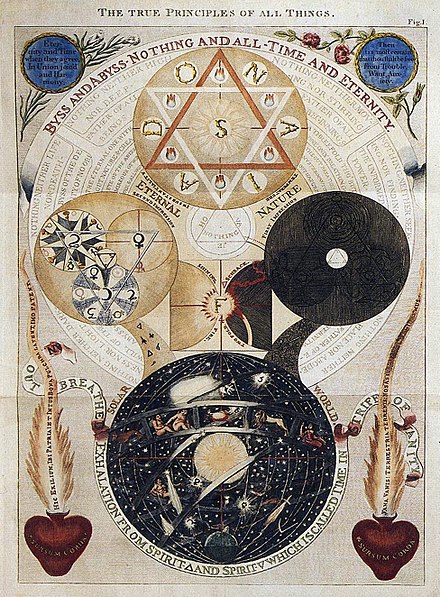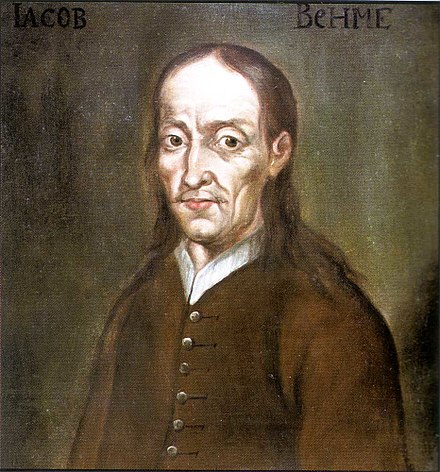
Jakob Boehme (probably April 24, 1575 - November 17, 1624) was a German Christian mystic and theologian. He is considered an original thinker within the Lutheran tradition. In contemporary English, his name may be spelled Jacob Boehme; in seventeenth-century England it was also spelled Behmen, approximating the contemporary English pronunciation of the German Boehme. Wikipedia, Boehme
video of life and times - https://vimeo.com/ondemand/boehmeeng

"Jacob Boehme, or Behmen, was born at Alt Seidenberg, a village near Görlitz, in 1575. His parents being poor, the education he received was of a very rudimentary nature, and when his schooling days were over, Jacob was apprenticed to a shoemaker. His religious nature caused him often to admonish his fellow-apprentices, which behaviour ultimately caused him to be dismissed.
He travelled about as a journeyman shoemaker, returning, however, to Görlitz in 1594, where he married and settled in business. He claims to have experienced a wonderful vision in 1598, and to have had a similar vision two years later. In these visions, the first of which lasted for several days, he believed that he saw into the inmost secrets of nature; but what at first appeared dim and vague became clear and coherent in a third vision, which he tells us was vouchsafed to him in 1610.
It was then that he wrote his first book, the Aurora, which he composed for himself only, in order that he should not forget the mysteries disclosed to him. At a later period he produced a large number of treatises of a mystical-religious nature, having spent the intervening years in improving his early education. These books aroused the ire of the narrow-minded ecclesiastical authorities of the town, and Jacob suffered considerable persecution in consequence. He visited Dresden in 1624, and in the same year was there taken ill with a fever. Returning to Görlitz, he expired in a condition of ecstasy.
Jacob Boehme was an alchemist of a purely transcendental order. He had, it appears, acquired some knowledge of Chemistry during his apprentice days, and he employed the language of Alchemy in the elaboration of his system of mystical philosophy. With this lofty mystical-religious system we cannot here deal; Boehme is, indeed, often accounted the greatest of true Christian mystics; but although conscious of his superiority over many minor lights, we think this title is due to Emanuel Swedenborg.
The question of the validity of his visions is also one which lies beyond the scope of the present work; we must confine our attention to Boehme as an alchemist. The Philosopher’s Stone, in Boehme’s terminology, is the Spirit of Christ which must “tincture” the individual soul. In one place he says, “The Phylosophers Stone is a very dark disesteemed Stone, of a Gray colour, but therein lyeth the highest Tincture.” In the transcendental sense, this is reminiscent of the words of Isaiah: “He hath no form nor comeliness; and when we see him, there is no beauty that we should desire him. . . . He was despised and we esteemed him not,” &c." [Alchemy: Ancient and Modern, c. 1922 by H. Stanley Redgrove]
"Therein I first knew what God and man were and what God had to do with men. Previously I understood little about the high articles of faith...much less about nature. For the Spirit shot through me like a bolt of lightning. I began to write like a school-boy, and so I wrote continuously, but only for myself.
For I saw and knew the Being of all beings, the ground and the unground; the birth of the holy trinity; the source and origin of this world and all creatures in divine Wisdom. I saw all three worlds in myself, the divine, angelical, or paradisiacal; the dark world; the external, visible world; and I saw and knew the whole being in evil and in good, how one originates in the other...so that I not only greatly wondered but also rejoiced...
For the Light's spirit moved my soul very much...repeating many things very often, ever deeper and clearer, from one step to another-it was the real Jacob's ladder." [Jacob Boehme]
"This German author, Jacob Boehme, who lived two centuries ago, and was looked upon in his time as the prince of divine philosophers, has left, in his numerous writings, which consist of about thirty different treatises, most astonishing and extraordinary openings, on our primitive nature; on the source of evil; the essence and laws of the universe; the origin of weight; on what he calls the seven wheels or powers of nature; the origin of water (confirmed by chemistry, which teaches that it is a burned body); on the nature of the crime of the angels of darkness; on that of man; on the mode adopted by Eternal Love, for the restitution of mankind in their rights; etc.
I think I do the reader a service, in advising him to make himself acquainted with this author; recommending him, however, to be armed with patience and courage, that he may not be repelled by the unusual form of his works; by the extremely abstract nature of the subjects he treats; and by the difficulty which the author (as he confesses himself) had in expressing his ideas, for the reason that most of the matters in question have no analogous names in our common languages.
The reader will there find that this physical elementary nature is only a residuum, a corruption (alteration) of an anterior nature, which the author calls Eternal Nature."
"That Man, formed, at once, of the principle of Fire, the principle of Light, and the Quintessential principle of physical elementary Nature, was placed in this world, to contain the dethroned guilty king; that this Man, though having in him the quintessential principle of elementary nature, was to keep it, as it were, absorbed in the pure element which then constituted his bodily form; but that, showing himself to be attracted more by the temporal principle of Nature than by the two other principles, was overcome by it, so as to fall asleep, as Moses expresses it; that, soon finding himself subdued by the material region of this world, he suffered his pure element to be swallowed up and absorbed in the gross form which envelopes us now; that he thus became the subject and victim of his enemy;
that Divine Love, which eternally contemplates itself in the Mirror of its Wisdom, by the author called SOPHIA, perceived in this mirror, in which all forms are comprised, the model and spiritual form of man; that He clothed Himself with this spiritual form, and afterwards with elementary form even, that He might present to man the image of what he had become, and the pattern what he ought to have been; that man's actual object on earth is to recover, physically and morally, the likeness of his first pattern; that the greatest obstacle he here meets with is the astral elementary power which engenders and constitutes the world, and for which Man was not made; that the actual procreation of man is a speaking witness of this truth, by the pains which pregnant women experience in all their members, as their fruit is formed in them, and attracts those gross astral substances; that the two tinctures, igneous and watery, which ought to be united in Man, and identify themselves with Wisdom or SOPHIA, (but are now divided,) seek each other ardently, hoping to find, the one in the other, that SOPHIA which they are in want of; but they only fall in with the astral, which oppresses and thwarts them; that we are free to restore, by our efforts, our spiritual being, to our first divine image, as we are to allow it to take the disorderly, inferior images; and that these divers images will constitute our mode of being, our glory or our shame, in a future state, etc." [Man: His True Nature & Ministry, L.-C. de Saint-Martin; trans. Edward B. Penny]
"ALL whatever is spoken, written, or taught of God, without the Knowledge of the Signature is dumb and void of Understanding; for it proceeds only from an historical Conjecture, from the Mouth of another, wherein the Spirit without Knowledge is dumb, but if the Spirit opens to him the Signature, then he understands the Speech of another; and further he understands how the Spirit has manifested and revealed itself (out of the Essence through the Principle) in the Sound with the Voice.
For though I see one to speak, teach, preach, and write of God, and though I hear and read the same, yet this is not sufficient for me to understand him; but if his Sound and Spirit out of his Signature and Similitude enter into my own Similitude, and imprint his Similitude into mine, then I may understand him really and fundamentally, be it either spoken or written, if he has the Hammer that can strike my Bell."
"This is now the Original of Enmity, that Nature opposes the Free-Will, and a Thing is at Enmity in itself; and here we understand the Center of Nature with three Forms, in the Original, viz. in the first Principle, it is Spirit; in the second it is Love, and in the third Principle Essence, and these three Forms are called in the third Principle Sulphur, Mercury, and Sal.
Understand it thus; Sul is in the first Principle the Free-Will, or the Lubet in the Nothing to Something, it is in the Liberty without Nature; Phur is the Desire of the free Lubet, and makes in itself, in the Phur, viz. in the Desire, an Essence, and this Essence is austere by Reason of the Attraction, and introduces itself into three Forms (as is above mentioned) and so forward into the fourth Form, viz. into the Fire; in the Phur the Original of the eternal and also external Nature is understood, for the Hardness is a Mother of the Sharpness of all Essences, and a Preserver of all Essences; out of the Sul, viz. out of the Lubet of the Liberty, the dark Anguish becomes a shining Light; and in the third Principle, viz. in the outward Kingdom, Sul is the Oil of Nature, wherein Life burns, and every Thing grows.
But now the Phur, viz. the Desire, is not divided from Sul, it is one Word, one Original also, and one Essence, but it severs itself into two Properties, viz. into Joy and Sorrow, Light and Darkness; for it makes two Worlds, viz. a dark Fire-World in the Austereness, and a Light Fire-World in the Lubet of the Liberty; for the Lubet of the Liberty is the only Cause that the Fire shines, for the Original Fire is dark and black, for in the shining of the Fire in the Original the Deity is understood, and in the dark Fire, viz. in the Anguish-Source, the Original of Nature is understood, and herein we do further understand the Cure.
The Source is the Cure of the free Lubet, viz. of the still Eternity; for the Stillness finds itself alive therein, it brings itself through the Anguish-Source into Life, viz. into the Kingdom of Joy, Namely that the Nothing is become an eternal Life, and has found itself, which cannot be in the Stillness." The Signature of All Things, by Jacob Boehme
See Also
Alchemy - Most Sacred Science
Etheric Force Identified as Dynaspheric Force
The Action of Force is Spiro-Vortex
Theosophical Siftings
Wisdom in Mystery - Keelys Progress - Part 1
